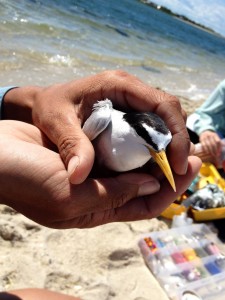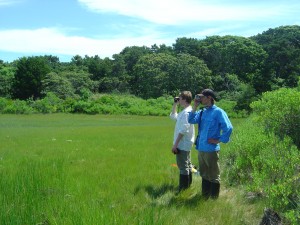
Brighter Planet
Margaret Smith, 2010
Before diving head first into the world of geography when I took the Geographic Information Systems (GIS) course this past fall, I held a general appreciation for maps and their ability to display a wide variety of information in a visually appealing way-but I never thought twice about how maps are made. However, after an intensive semester of GIS instruction and practice, I’ve walked away with a much greater appreciation for every map I see, along with a more critical eye for what the map contains, after having spent so many hours myself producing maps for our GIS labs.
This J-term I had the opportunity to apply my newly acquired GIS skills as an intern for Brighter Planet, a company located in downtown Middlebury that was founded by some recent Middlebury graduates. Working with GIS in a realistic context, where datasets are massive, no one is handing you sequential steps to follow and files aren’t neatly contained in a folder titled Lab Assignment 7, provided me with an even wider awareness of, and gratefulness for, the large efforts and tough decisions that lie behind the layers of even the visually simplest of maps.
When presented with the appropriate shape files and neatly compiled data tables, a simple map can actually be put together quite quickly using GIS software. However, one of the things that we learned in the GIS classroom this fall is that before you can begin analyzing data and then displaying it in a map, that data must be collected, which tends to be the most time-consuming step in the process.
I couldn’t truly value this statement until I myself spent countless hours during J-term compiling data files from a comparatively enormous dataset, which thankfully had already been collected and cleaned up by others who were brave enough to do so. The specific project that I was working on for Brighter Planet was, at least in the first place, using GIS to incorporate zip codes, and the emissions for power plants that serve those zip codes, into the company’s carbon footprint calculator found on their website. Without knowing how long this project would take, I commenced at the beginning of the month by first making sense of the large files of eGRID2007 subregion emissions data that Ian, my on-site supervisor, provided me.
Once I was able to compile the zip code information needed for the online calculator, I moved on to more visually appealing work. As we made sense of the mountains of numbers and began to view them within a geographical framework, what we discovered was that there were numerous interesting ways to map the emissions data-some involving additional data collection on my part, and others using the data already summarized in the eGRID files. With every map I made, Ian provided feedback as we worked together to make the many decisions behind each map layer.
Ian and I held meetings in the GIS lab from time to time to catch up on my most recent work and to fiddle around with the features of each map. As I showed him some of the different visual options we faced in deciding the appearance and the take-home messages of the maps, I found myself very comfortable navigating the GIS software, a technological territory that was completely foreign to me mere months ago. It gave me confidence to know that I had acquired the specialized skills that could enable me to help out a company, such as Brighter Planet, by providing them with access to the GIS and its powerful tools of analysis and display.
I worked on this project very diligently throughout the month, every day logging many hours at the computers in the GIS lab, which was already my second home after having taken GIS in the fall. One of the most rewarding things for me about using GIS for my internship was that, because my experience with the software is still minimal, I learned something new every day. I’ve walked away from this internship having learned that I can be handed a daunting file bursting with numbers, with few specific instructions or predictions of what the end results might be, and I will be able to work through the files and use GIS to make a visually significant product, an informative map, with what started as a long list of numbers.
Interning with Brighter Planet was a very enjoyable way to spend my J-term; it gave me a realistic experience using GIS outside of the classroom. The company is small, and is run by a group of young individuals who are enthusiastic about the work they do and were especially eager to have some enlightening maps produced specifically for their use. I’ve realized that I really do enjoy making maps with GIS, even more so when motivated by the products’ practical purposes instead of letter grades. One of the reasons why I enjoy GIS, and geography in general, is that it can be used to analyze and visualize any sort of data that has a spatial attribute. At this point, I can certainly imagine myself using my GIS skills somewhere down the road to find a job in a geography-related field. This internship has aided me in reasserting my keenness for the visual art and science of GIS, and has also provided me with a more realistic look at how this mapping software, and my future degree in geography, can be applied to a real-world context outside of the classroom.
In the end, the unpredictable products of this month-long project that I have tackled as an intern for Brighter Planet were a few Excel worksheets full of population and zip code data, emissions totals and rates along with other such numbers. Together with those files, I also ultimately finalized about five maps-though many others were created in the trial-and-error process of figuring out what data was best to map in which geographical extent. Essentially, when I’ve shown this work to others who are not familiar with GIS, this is a seemingly modest creation for a month’s worth of work. It seems that only a person who has had experience collecting data and finally making a map using the software can truly appreciate the time and thought that goes into every aspect-every layer and each of its many attributes-presented in a single map.
Not every map reader can look at a map and realize the process by which that map was made-but I suppose that’s sort of the point of a map, right? A map is a graphic that usually presents a lot of information with a quickly evident message, so that the reader need not think about all the information, time and effort that lies beneath what meets the eye. And though most readers will never know what’s embedded within the layers of the map-which is probably a good thing, as they might become overwhelmed-I’ve realized as a map-maker that I gain huge satisfaction from finally reaching the display phase of the process as I near the final product. When I can add the finishing touches on the borders and the legend, as I use small, simple text to credit the massive dataset that I spent hours pouring through and as I place my name in the corner, giving myself a pat on the back, all the work then seems worth the while.
I was faced with many frustrating moments during this internship when the problems that lay in front of me seemed to lack solutions, when the data I sought seemed nonexistent or if I became suddenly overwhelmed by the countless files I’d scattered in various folders. These moments were outweighed as each hurdle was overcome and I was able to finally discover the exact data I was looking for or when I learned a short cut that would save me lots of time down the road. I’m glad to have had this experience interning with Brighter Planet. It has been rewarding to make maps for a greater purpose than mere grades, to see my GIS skills further improve over the last month and to realize that if this were a field that I chose to pursue, there would be plenty of room for even more improvement and there would be even more gratifying mapping projects to tackle.
Contact the Career Services Office for more information on this internship.
 What are your plans for the future?
What are your plans for the future?


